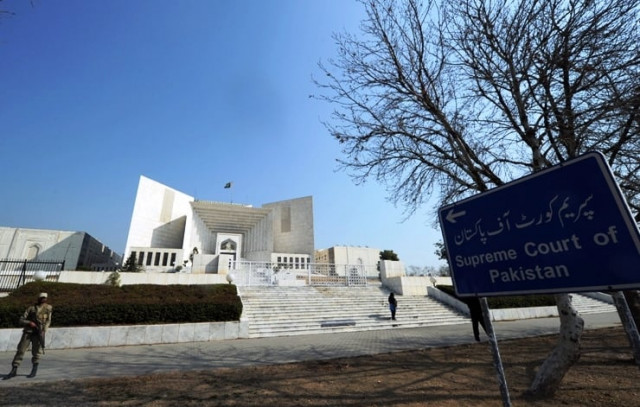Investigation procedures: SC seeks record of complaints against police
Court unhappy with progress in Nasrullah Warraich murder case.

The Supreme Court continued expressing its displeasure with the police on Tuesday and sought a report on the number of complaints filed against the province’s police officers during the last three years, the nature of the complaints, and what had been done to address them.
During the hearing of a suo motu case regarding the murder of senior lawyer Nasrullah Warraich, the two-member bench of Justice Jawwad S Khawaja and Justice Amir Hani Muslim directed Advocate General Ashtar Ausaf Ali to submit a statistical report showing the number of complaints, the nature of the complaints and the number of subsequent convictions or exonerations.
At the onset of proceedings, an investigating officer from Gulshan-i-Ravi police station told the judges that the murder was a result of an old enmity. He said Warraich’s older brother and sister in-law had been killed in 1986 as part of the same feud, though the two sides had later reconciled.
However, the officer failed to present the police record of the reconciliation and failed to explain why he hadn’t arrested Warraich’s killers.
Justice Khawaja, expressing serious displeasure over the police performance, addressed the SP for investigations: “Do you think this officer should be allowed to remain in uniform?”
To the advocate general, he said the government’s attempts to set up the Punjab Criminal Prosecution Service had been feeble. “Even one percent implementation is not seen in the Police and Prosecution Departments,” he said.
The judge handed a PCPS booklet to the SP and asked him to read it out so he could learn his responsibilities. The officer read the text for the court and conceded that the investigation police had not fulfilled their responsibilities in this case.
Justice Khawaja momentarily turned his ire at the fact that the booklet was in English and not in Urdu. “God knows when we will get rid of this slavery,” he said, before returning his attention to the police.
“We are seeing nothing in investigations except sheer incompetence and dishonesty. Mr Ashtar, insensitivity is prevailing everywhere and we (judges) are also responsible.”
Pakistan Bar Council member Azam Nazir Tarar informed the court that on the direction of the inspector general of police, a three-member investigation team had been set up three days after Warraich’s murder.
He said bar leaders had been working with the police team but there had been no progress. He said that two of the team’s members had been transferred while the third was present in the court.
Justice Khawaja asked the advocate general why the “Khadim-i-Aala” was not paying attention to this problem, as it appeared the investigation team was not being allowed to do its work.
“We (judges) are actually doing the job of the chief executive,” he observed.
Concluding the hearing on the matter, the judge directed the advocate general to submit the report about complaints against police officers and subsequent convictions.
He said he was sure that no police officers above grade 15 had been convicted. The bench adjourned the hearing till April 11.
Other cases
The court then took up the Faisalabad gang rape and attempted murder case, with DPO Bilal Siddique Kamyana, the SSP investigations and the main accused, Asghar Ali, all present in the court.
The advocate general said that the arrest of the accused was possible only because of the court’s pressure. The SSP said that Ali had been arrested from Sukkur and he had denied the charges against him during the initial interrogation.
He asked for a two-week adjournment till a medical board examines the alleged victim. He said the board would meet on Wednesday at Faisalabad Civil Hospital to determine whether she had been shot.
The bench accepted the plea and directed the SSP to complete the investigation and submit the challan.
In the case of Sobia, the alleged abducted maid, the bench directed Model Town SP (Investigation) Ijaz Shafi Dogar to produce the girl within two days. The court also asked the SP to release an accused if the police found no evidence against him, but without taking a bribe.
Taking up another case of illegal dispossession and firing in Lahore, the bench directed a DSP to complete the investigation of the case.
Earlier, the DSP told the court that the offence had been established but the complainant, Khursheed Bibi, had refused to identify two of the arrested accused.
Published in The Express Tribune, March 28th, 2012.



















COMMENTS
Comments are moderated and generally will be posted if they are on-topic and not abusive.
For more information, please see our Comments FAQ